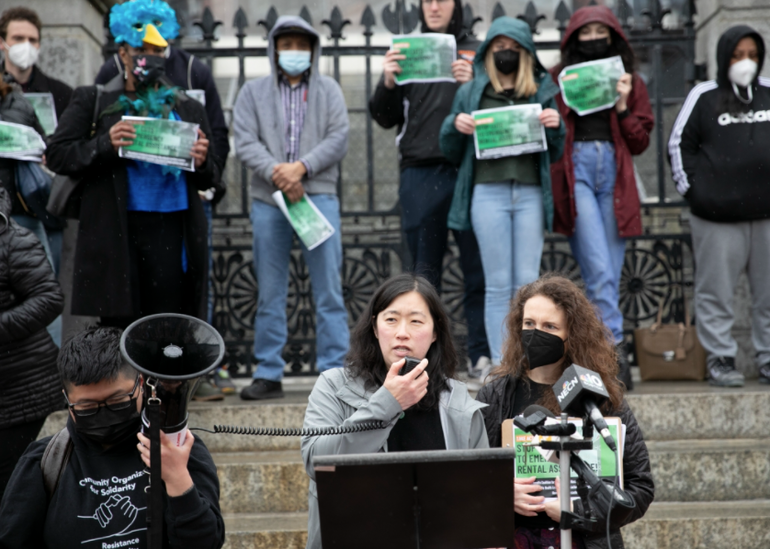Without the crutch of pandemic-era emergency rental assistance, Antonia De Leon of Lynn worries that she and her family might not have been able to remain in their home.
They had never fallen behind on rent before the pandemic, De Leon said, but once COVID-19 hit, her husband lost his restaurant work and she had to change to a new, lower-paying job.
De Leon and her family turned to the Emergency Rental Assistance Program, or ERAP, which offers up to 18 months’ worth of aid available to cover rental arrears and future rent for tenants impacted financially by COVID-19.
“If this program hadn’t existed, I could’ve gone to the streets homeless with my family,” De Leon, speaking in Spanish with an English interpreter, told a crowd of advocates and reporters outside the State House on Tuesday. “There are lots of families who need this assistance, but sometimes their stories aren’t heard.”
After Friday, Massachusetts residents will no longer be able to apply for housing aid covered by the federal ERA dollars, which the Baker administration says are dwindling and likely to run out before June 30.
Families in need can still turn to the state-funded Residential Assistance for Families in Transition program — which will receive a $100 million boost under a supplemental budget Gov. Charlie Baker signed April 1 — but housing advocates warn that the alternative will be insufficient to match the scope of need with COVID-19 threats still lingering.
ERAP offered more extensive benefits with looser eligibility requirements, allowing households earning up to 80 percent of the area median income to apply compared to the 50 percent threshold in RAFT.
Pointing to De Leon as an example, Massachusetts Law Reform Institute Director of Community Based Advocacy Andrea Park said the Lynn family would not be eligible for RAFT even though they still struggle to make ends meet.
“If this program ends on Friday, as of next week, she will not be eligible for any rental assistance,” Park said. “What is going to happen to Antonia and many like her?”
“A lot of us were sick with COVID as recently as February, and so I think as much as we want this to be in the rearview mirror — and we are making a lot of progress toward that — we need to remember there are still people who are really struggling to get back on their feet,” Park added. “This is an emergency program. There’s emergency money we still have available.”
Since the start of the ERAP program in March 2021, the Baker administration has distributed more than $600 million to 74,200 households, according to a spokesperson. Officials projected last month that the state had about $200 million in unspent federal rental aid funds, all of which the administration anticipates exhausting by the end of the fiscal year at the current rate of applications and payments.
The supplemental budget that boosted RAFT funding by $100 million also extended until March 31, 2023 pandemic-era eviction protections that require courts to pause any proceedings for failure to pay rent if a tenant has a pending application for aid.
Rally attendees on Tuesday renewed their call for lawmakers to tap into state government’s roughly $2.3 billion in remaining federal American Rescue Plan Act funds or a developing tax revenue surplus to keep expanded emergency housing aid flowing.
“All those words we heard about the importance of front-line workers, about people finally recognizing the connection between health and housing, about racial disparities and economic disparities — we heard lots of nice statements from the governor and from the Legislature,” said Lynn United for Change Empowerment Project Director Isaac Simon Hodes. “This is where the rubber hits the road. Cutting a program like this is just going to exacerbate those exact same divides.”

